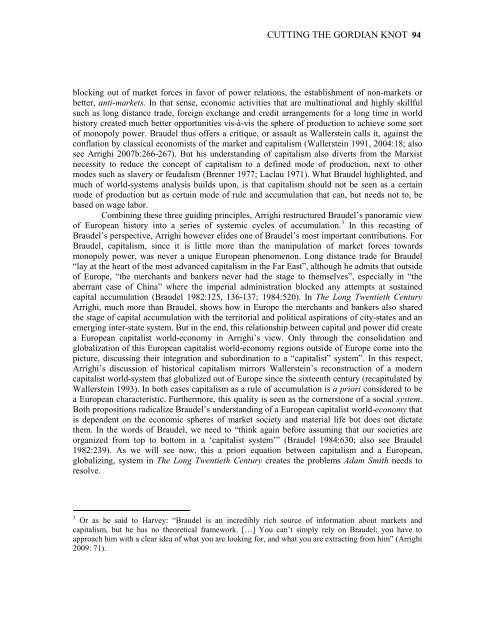Entire Volume 17 issue 1 - Journal of World-Systems Research ...
Entire Volume 17 issue 1 - Journal of World-Systems Research ...
Entire Volume 17 issue 1 - Journal of World-Systems Research ...
You also want an ePaper? Increase the reach of your titles
YUMPU automatically turns print PDFs into web optimized ePapers that Google loves.
CUTTING THE GORDIAN KNOT 94<br />
blocking out <strong>of</strong> market forces in favor <strong>of</strong> power relations, the establishment <strong>of</strong> non-markets or<br />
better, anti-markets. In that sense, economic activities that are multinational and highly skillful<br />
such as long distance trade, foreign exchange and credit arrangements for a long time in world<br />
history created much better opportunities vis-à-vis the sphere <strong>of</strong> production to achieve some sort<br />
<strong>of</strong> monopoly power. Braudel thus <strong>of</strong>fers a critique, or assault as Wallerstein calls it, against the<br />
conflation by classical economists <strong>of</strong> the market and capitalism (Wallerstein 1991, 2004:18; also<br />
see Arrighi 2007b:266-267). But his understanding <strong>of</strong> capitalism also diverts from the Marxist<br />
necessity to reduce the concept <strong>of</strong> capitalism to a defined mode <strong>of</strong> production, next to other<br />
modes such as slavery or feudalism (Brenner 1977; Laclau 1971). What Braudel highlighted, and<br />
much <strong>of</strong> world-systems analysis builds upon, is that capitalism should not be seen as a certain<br />
mode <strong>of</strong> production but as certain mode <strong>of</strong> rule and accumulation that can, but needs not to, be<br />
based on wage labor.<br />
Combining these three guiding principles, Arrighi restructured Braudel’s panoramic view<br />
<strong>of</strong> European history into a series <strong>of</strong> systemic cycles <strong>of</strong> accumulation. 3<br />
In this recasting <strong>of</strong><br />
Braudel’s perspective, Arrighi however elides one <strong>of</strong> Braudel’s most important contributions. For<br />
Braudel, capitalism, since it is little more than the manipulation <strong>of</strong> market forces towards<br />
monopoly power, was never a unique European phenomenon. Long distance trade for Braudel<br />
“lay at the heart <strong>of</strong> the most advanced capitalism in the Far East”, although he admits that outside<br />
<strong>of</strong> Europe, “the merchants and bankers never had the stage to themselves”, especially in “the<br />
aberrant case <strong>of</strong> China” where the imperial administration blocked any attempts at sustained<br />
capital accumulation (Braudel 1982:125, 136-137; 1984:520). In The Long Twentieth Century<br />
Arrighi, much more than Braudel, shows how in Europe the merchants and bankers also shared<br />
the stage <strong>of</strong> capital accumulation with the territorial and political aspirations <strong>of</strong> city-states and an<br />
emerging inter-state system. But in the end, this relationship between capital and power did create<br />
a European capitalist world-economy in Arrighi’s view. Only through the consolidation and<br />
globalization <strong>of</strong> this European capitalist world-economy regions outside <strong>of</strong> Europe come into the<br />
picture, discussing their integration and subordination to a “capitalist” system”. In this respect,<br />
Arrighi’s discussion <strong>of</strong> historical capitalism mirrors Wallerstein’s reconstruction <strong>of</strong> a modern<br />
capitalist world-system that globalized out <strong>of</strong> Europe since the sixteenth century (recapitulated by<br />
Wallerstein 1993). In both cases capitalism as a rule <strong>of</strong> accumulation is a priori considered to be<br />
a European characteristic. Furthermore, this quality is seen as the cornerstone <strong>of</strong> a social system.<br />
Both propositions radicalize Braudel’s understanding <strong>of</strong> a European capitalist world-economy that<br />
is dependent on the economic spheres <strong>of</strong> market society and material life but does not dictate<br />
them. In the words <strong>of</strong> Braudel, we need to “think again before assuming that our societies are<br />
organized from top to bottom in a ‘capitalist system’” (Braudel 1984:630; also see Braudel<br />
1982:239). As we will see now, this a priori equation between capitalism and a European,<br />
globalizing, system in The Long Twentieth Century creates the problems Adam Smith needs to<br />
resolve.<br />
3 Or as he said to Harvey: “Braudel is an incredibly rich source <strong>of</strong> information about markets and<br />
capitalism, but he has no theoretical framework. […] You can’t simply rely on Braudel; you have to<br />
approach him with a clear idea <strong>of</strong> what you are looking for, and what you are extracting from him” (Arrighi<br />
2009: 71).





